Gender in niGeria report 2012 - Economic Commission for Africa
Gender in niGeria report 2012 - Economic Commission for Africa
Gender in niGeria report 2012 - Economic Commission for Africa
Create successful ePaper yourself
Turn your PDF publications into a flip-book with our unique Google optimized e-Paper software.
<strong>Gender</strong> <strong>in</strong> Nigeria Report <strong>2012</strong>: Improv<strong>in</strong>g the Lives of Girls and Women <strong>in</strong> Nigeria 57<br />
Much of the detailed work on the factors <strong>in</strong>fluenc<strong>in</strong>g women’s participation dur<strong>in</strong>g the<br />
Fourth Republic is found <strong>in</strong> work by Oladeye (2011), 41 Salihu (2011), Irabor (2011), 42<br />
WRAPA (2004), and Ityavyar and Ityavyar (2002). Table 31 is a summary of the covariate<br />
and idiosyncratic factors that <strong>in</strong>fluence women’s ability to successfully compete <strong>for</strong><br />
political office <strong>in</strong> Nigeria. It shows that a complex mix of personal and shared issues<br />
comb<strong>in</strong>e to underm<strong>in</strong>e the broader representation of women. Although there is a def<strong>in</strong>ite<br />
need to understand the specific experiences of women who participated <strong>in</strong> the April<br />
2011 election, general factors that affect the <strong>in</strong>dividual – like education, health, f<strong>in</strong>ance<br />
and reproductive roles – are issues that could be dealt with if the political will existed<br />
to use public policy to support women candidates (Salihu, 2011). Bann<strong>in</strong>g political<br />
meet<strong>in</strong>gs at night and legislat<strong>in</strong>g aga<strong>in</strong>st political violence, <strong>for</strong> example, might assist<br />
women candidates to emerge, if these measures were effectively en<strong>for</strong>ced. Issues<br />
relat<strong>in</strong>g to the nature of political space could also be dealt with by gender-balanced<br />
electoral re<strong>for</strong>m. Oladoye (2011) argues that sett<strong>in</strong>g an agreed quota system with<strong>in</strong> and<br />
between the parties could be a useful start<strong>in</strong>g po<strong>in</strong>t. Evidence from countries like South<br />
<strong>Africa</strong> and Rwanda that have managed to <strong>in</strong>crease women’s participation <strong>in</strong> politics<br />
suggests that, until women candidates are nom<strong>in</strong>ated at party level to contest w<strong>in</strong>nable<br />
seats, talk of equity <strong>in</strong> gender representation will be slow and may not be achievable <strong>in</strong><br />
the short-term. 43<br />
Table 31. Factors <strong>in</strong>fluenc<strong>in</strong>g women’s participation <strong>in</strong> politics.<br />
Idiosyncratic factors Effects Covariate factors Effects<br />
Low level of education<br />
(especially <strong>in</strong> the<br />
North); requirement<br />
to have completed<br />
secondary education.<br />
Lack of capacity, <strong>in</strong>:<br />
political and <strong>in</strong>terpersonal<br />
skills and<br />
knowledge; public<br />
speak<strong>in</strong>g; organis<strong>in</strong>g<br />
and coord<strong>in</strong>at<strong>in</strong>g<br />
campaigns; advocacy<br />
and negotiation.<br />
F<strong>in</strong>ancial constra<strong>in</strong>ts: 43<br />
Candidates lack<br />
resources <strong>for</strong><br />
registration fees, to<br />
establish campaign<br />
structures, etc.<br />
Up to 50% of<br />
aspirants failed to<br />
qualify <strong>for</strong> elections<br />
to State assembly.<br />
Ineffective<br />
campaigns.<br />
Ineffective<br />
campaigns.<br />
Cultural attitudes:<br />
women need<br />
husbands’ permission<br />
to attend meet<strong>in</strong>gs<br />
or be <strong>in</strong>volved <strong>in</strong> any<br />
activity outside the<br />
home (<strong>in</strong> some cases<br />
even to visit hospitals).<br />
Political environment:<br />
fear of <strong>in</strong>timidation,<br />
physical assault<br />
and name call<strong>in</strong>g;<br />
whisper campaigns<br />
and <strong>in</strong>nuendos about<br />
moral stand<strong>in</strong>g.<br />
Registration<br />
regulations are<br />
complex; candidates<br />
are required to submit<br />
tax declarations.<br />
Candidates<br />
sacrifice<br />
their political<br />
ambition to<br />
avoid domestic<br />
problems.<br />
Withdrawal<br />
of candidates<br />
who put their<br />
reputation be<strong>for</strong>e<br />
a political career.<br />
Many <strong>in</strong> the<br />
North lack bank<br />
accounts and fail<br />
to qualify.<br />
Reproductive roles:<br />
women need to be<br />
home <strong>in</strong> the even<strong>in</strong>gs<br />
and at night to feed<br />
and care <strong>for</strong> their<br />
children, etc.<br />
Aspirants cannot<br />
attend night and<br />
even<strong>in</strong>g meet<strong>in</strong>gs<br />
and there<strong>for</strong>e<br />
cannot be<br />
considered.<br />
Lack of a quota<br />
system.<br />
Women aspirants<br />
fail to make party<br />
lists; only those<br />
who are active <strong>in</strong><br />
male patronage<br />
networks are<br />
successful.<br />
41 At: http://www.cp-africa.com/2011/05/17/<strong>in</strong>-retrospect-2011-april-polls-and-gender-rank<strong>in</strong>g-<strong>in</strong>-nigeria/#/news/.<br />
42 At: http://www.baobabwomen.org/Review%20of%20Women’s%20Participation%20and%20Per<strong>for</strong>mance%20at%2 0the%202011%20<br />
General%20Election%20<strong>in</strong>%20Nigeria.pdf.<br />
43 The Federal M<strong>in</strong>istry <strong>for</strong> Women’s Affairs did offer some f<strong>in</strong>ancial support to women candidates <strong>in</strong> the April 2011 elections.

















